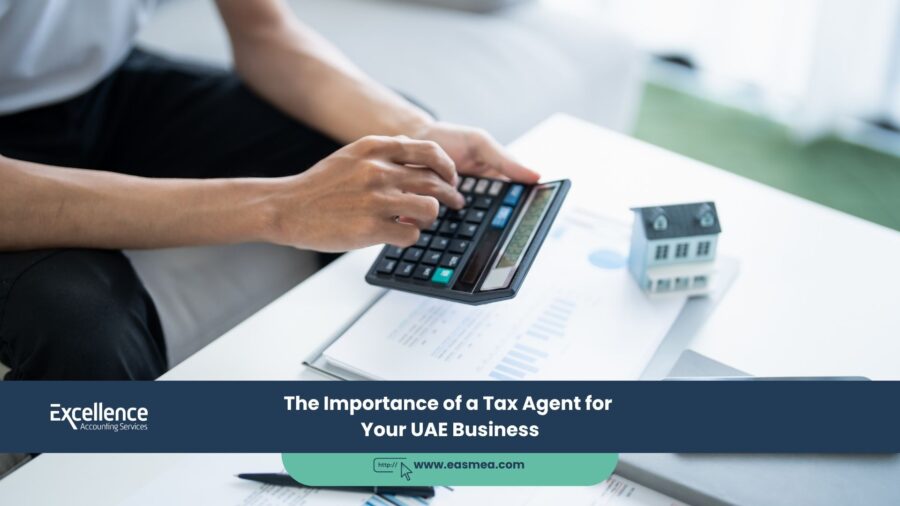The Importance of a Tax Agent for Your UAE Business
The United Arab Emirates’ transformation into a global business hub has been accompanied by the maturation of its fiscal framework. The introduction of Value Added Tax (VAT) in 2018 was a significant milestone, followed by the landmark implementation of Corporate Tax (CT) in 2023. This evolution has fundamentally changed the compliance landscape. For business owners and managers, navigating this new terrain of complex legislation, stringent deadlines, and detailed record-keeping requirements is no longer a secondary administrative task—it is a critical component of business strategy and risk management.
- The Importance of a Tax Agent for Your UAE Business
- Part 1: Defining the Role - What is a Tax Agent?
- Part 2: The Core Functions and Responsibilities of a Tax Agent
- Part 3: The Tangible Business Benefits of Appointing a Tax Agent
- What Excellence Accounting Services (EAS) Can Offer
- Frequently Asked Questions (FAQs)
- Secure Your Business. Appoint Your Expert Tax Partner.
In this high-stakes environment, the question is not whether you can afford professional tax guidance, but whether you can afford to be without it. The role of a Federal Tax Authority (FTA) accredited Tax Agent has become indispensable. A Tax Agent is far more than just a consultant or an accountant; they are your official representative, your strategic advisor, and your first line of defense in all tax-related matters. Appointing a Tax Agent is not a sign of weakness but a mark of strategic foresight. This guide will explore the profound importance of this role, detailing how a certified Tax Agent can safeguard your business, optimize your financial position, and provide the peace of mind needed to focus on what you do best: growing your business.
Key Takeaways: Why a Tax Agent is Essential
- Official Representation: A Tax Agent is legally empowered to represent your business before the FTA, handling all communications, audits, and disputes.
- Expert Knowledge: They possess deep, specialized, and up-to-date knowledge of both VAT and Corporate Tax laws, far beyond that of a general accountant.
- Risk Mitigation: Proactively identifying and correcting potential issues, a Tax Agent significantly reduces the risk of non-compliance and costly penalties.
- Strategic Advantage: Beyond compliance, they provide strategic advice on tax planning and efficiency, turning tax management into a value-added function.
- A Strategic Investment: The cost of hiring a Tax Agent is minimal compared to the potential financial and reputational damage of tax errors and penalties.
Part 1: Defining the Role – What is a Tax Agent?
It’s crucial to understand that a “Tax Agent” is a specific, legally defined, and regulated profession in the UAE. It is not a generic term for anyone who offers tax advice.
As defined by the FTA, a Tax Agent is a person or entity registered with the Authority in the Register of Tax Agents who is appointed on behalf of another person to represent them before the FTA and to assist them in the fulfillment of their tax obligations and the exercise of their associated tax rights.
To become an accredited Tax Agent, an individual or firm must meet stringent criteria set by the FTA, including holding relevant professional qualifications, proving practical experience, and passing rigorous examinations. This ensures they possess the highest level of competence and ethical standards.
Tax Agent vs. In-House Accountant: A Critical Distinction
While an in-house accountant is vital for day-to-day accounting and bookkeeping, their role is fundamentally different from a Tax Agent’s.
| Aspect | In-House Accountant | FTA-Approved Tax Agent |
|---|---|---|
| Primary Focus | Recording daily transactions, managing payroll, preparing financial statements. | Strategic tax compliance, legal interpretation, risk management, and official FTA representation. |
| Legal Standing | Cannot officially represent the company in tax disputes or audits before the FTA. | Legally appointed and authorized to act as the company’s representative. |
| Knowledge Base | Broad accounting knowledge. Tax knowledge may be general or limited. | Deep, specialized, and continuously updated expertise in UAE tax legislation and FTA procedures. |
| Role | Operational and transactional. | Strategic, advisory, and representative. |
An in-house team provides the data; a Tax Agent interprets that data through the lens of complex tax law, ensuring it is reported correctly and strategically. They work in tandem, but their functions are distinct and complementary.
Part 2: The Core Functions and Responsibilities of a Tax Agent
A Tax Agent’s responsibilities cover the entire lifecycle of a business’s tax obligations, from initial setup to ongoing compliance and dispute resolution.
1. Ensuring Accurate Tax Registration
The first step in compliance is correct registration. A Tax Agent ensures that your business completes its VAT registration and Corporate Tax registration accurately and within the stipulated deadlines, avoiding the initial penalties that can arise from simple administrative errors.
2. Managing Tax Filings and Payments
This is a cornerstone of their role. A Tax Agent is responsible for:
- Reviewing your financial data to ensure it is tax-ready.
- Preparing and submitting accurate VAT returns and Corporate Tax returns.
- Ensuring all deadlines for filing and payment are met without fail.
- Advising on the correct treatment of complex transactions.
3. Official Representation and Communication with the FTA
This is where a Tax Agent provides immense value. They act as the single point of contact between your business and the FTA. This includes:
- Responding to any queries or requests for information from the FTA.
- Representing you during a tax audit, guiding you through the process, and managing the submission of required documents.
- Filing reconsideration requests if you disagree with a decision made by the FTA.
- Handling applications for de-registration when necessary.
This representation is not just administrative; it’s a legal and procedural shield for your business. An experienced Tax Agent knows how to communicate with the authorities, present information effectively, and argue points of law on your behalf.
4. Providing Strategic Tax Advisory
A great Tax Agent goes beyond simple compliance. They function as a strategic advisor, offering guidance on:
- Tax Planning: Structuring transactions and operations in the most tax-efficient manner within the bounds of the law.
- Impact Assessment: Advising on the tax implications of major business decisions, such as mergers, acquisitions, or launching new products. This often involves detailed feasibility studies.
- Compliance Health Checks: Proactively reviewing your systems and processes to identify and rectify potential areas of non-compliance before they become problems.
This advisory function can be considered a form of high-level business consultancy, focused on fiscal health.
Part 3: The Tangible Business Benefits of Appointing a Tax Agent
Engaging a Tax Agent is not a cost center; it is a strategic investment that delivers a significant return through risk reduction, efficiency gains, and financial optimization.
Benefit 1: Cost Savings Through Penalty Avoidance
The FTA imposes strict penalties for late registration, late filing, incorrect returns, and late payments. These penalties can accumulate rapidly and represent a significant, entirely avoidable drain on a company’s resources. The primary role of a Tax Agent is to ensure these errors never occur. The annual fee for a Tax Agent is almost invariably a fraction of the cost of a single major penalty.
Benefit 2: Time and Resource Optimization
Tax compliance is a time-consuming process that demands focus and expertise. By outsourcing this function to a Tax Agent, business owners, managers, and in-house finance teams are freed from the burden of keeping up with complex legislation and can redirect their time and energy toward core, revenue-generating activities.
Benefit 3: Access to Specialized, Up-to-Date Expertise
Tax laws and regulations are not static; they evolve. The FTA frequently issues new guides, clarifications, and cabinet decisions. A dedicated Tax Agent’s profession is to stay on top of every single one of these changes. This ensures your business benefits from the latest information and avoids falling foul of a new rule you were unaware of. This level of specialized knowledge is something an in-house team, with its broader responsibilities, can rarely match.
Benefit 4: Enhanced Accuracy and Peace of Mind
Knowing that a certified, experienced professional is overseeing your tax affairs provides invaluable peace of mind. It removes the anxiety associated with tax deadlines and the fear of making a costly mistake. This confidence allows business leaders to make decisions with greater certainty, knowing the tax implications have been properly managed by an expert.
What Excellence Accounting Services (EAS) Can Offer
At Excellence Accounting Services, we are more than just accountants; we are FTA-approved Tax Agents dedicated to providing comprehensive, strategic tax support to businesses across the UAE. We embody the principles of expertise, diligence, and partnership.
- Official Tax Agent Services: We are fully accredited by the FTA to act as your official Tax Agent, handling all your compliance and representation needs for both VAT and Corporate Tax.
- Holistic Financial Management: Our services extend beyond tax. We offer integrated support, from bookkeeping and payroll services to high-level CFO services, ensuring your entire financial ecosystem is robust and efficient.
- Proactive Audit Support: Our internal audit and external audit teams can prepare your business for FTA scrutiny, ensuring your records are defensible and transparent.
- Specialized Advisory: Whether you need a business valuation for a transaction or a due diligence review, our expert teams provide the data-driven insights you need.
Frequently Asked Questions (FAQs)
No, it is not legally mandatory for a business to appoint a Tax Agent. However, given the complexity of the tax laws and the severity of non-compliance penalties, it is highly recommended and considered a best practice for most businesses, especially SMEs and large corporations.
A “Tax Agent” is an official, FTA-accredited professional who can legally represent you. A “Tax Consultant” is a more general term for someone who provides tax advice but may not have the official accreditation or legal standing to represent you before the FTA in audits or disputes.
The appointment is done electronically via the EmaraTax portal. Your chosen Tax Agent will initiate the request to be linked to your Tax Registration Number (TRN). You will then receive a notification in your portal to review and approve the request, formalizing the relationship.
Yes. A registered Tax Agent is qualified to handle all tax-related matters with the FTA, including both VAT and Corporate Tax. Appointing a single firm to manage both ensures a consistent, integrated approach to your overall tax strategy.
While the Tax Agent has a professional responsibility to ensure accuracy, the ultimate legal responsibility for the correctness of the tax return and payment of the tax remains with the taxable person (the business). This is why it’s crucial to choose a reputable, experienced, and insured Tax Agent.
The cost varies depending on the size of your business, the volume and complexity of your transactions, and the scope of services required. It can range from a modest annual retainer for basic compliance for an SME to a more significant fee for a large corporation requiring extensive advisory services. However, this cost should be weighed against the significant financial risks of non-compliance.
Yes. The process involves formally disassociating from your current Tax Agent within the EmaraTax portal and then appointing the new one. It’s a straightforward administrative process designed to give businesses flexibility.
Even small businesses can benefit immensely. Tax laws apply to all, and an error made by a small business can have a proportionally larger impact on its cash flow. A Tax Agent can provide cost-effective compliance packages tailored for smaller enterprises, ensuring they start on the right foot.
You will need to provide them with access to your accounting records, sales invoices, expense receipts, bank statements, contracts, and any other documents relevant to your financial activities. A good Tax Agent will provide a clear list of requirements and help you implement systems for efficient data sharing, such as an accounting system implementation.
Registered Tax Agents are bound by strict professional codes of conduct and ethics, which include a duty of confidentiality. They are legally and professionally obligated to keep your financial and business information private and secure.
Conclusion: An Indispensable Partner in a New Tax Era
In the evolving fiscal landscape of the UAE, navigating tax compliance is no longer a simple matter of filling out forms. It requires strategic insight, legal expertise, and a proactive approach to risk management. An FTA-approved Tax Agent is the indispensable partner who provides all three. They are the bridge between your business and the tax authorities, translating complex legal requirements into actionable business practices. Appointing a Tax Agent is one of the most prudent and powerful decisions a business can make—an investment not just in compliance, but in security, efficiency, and long-term success.




